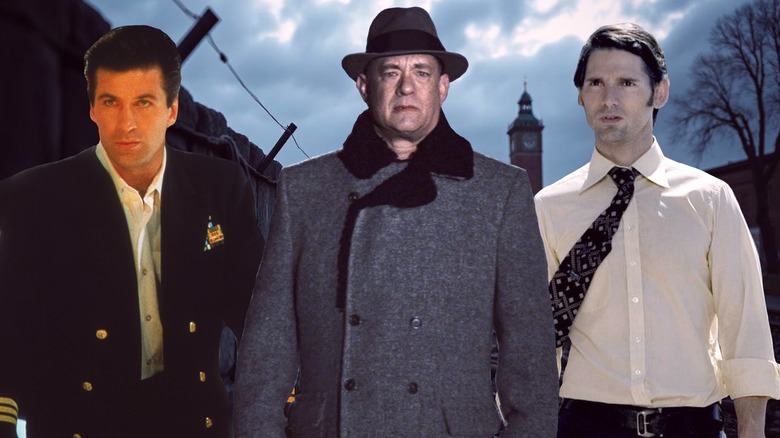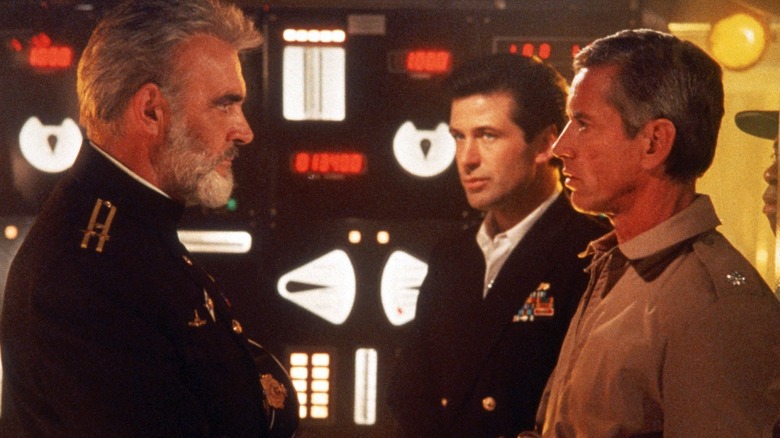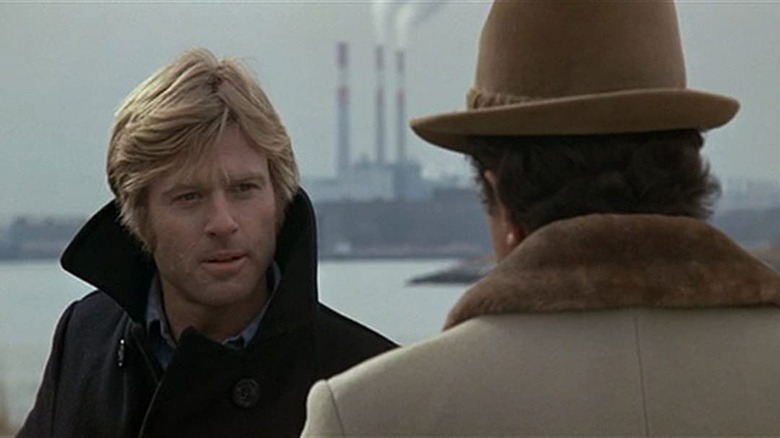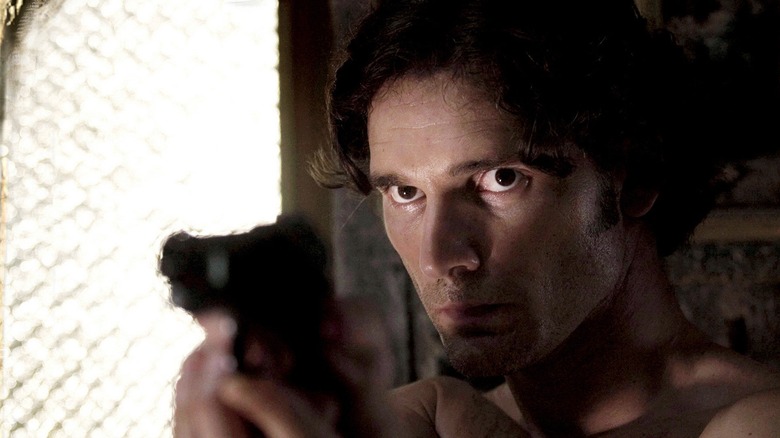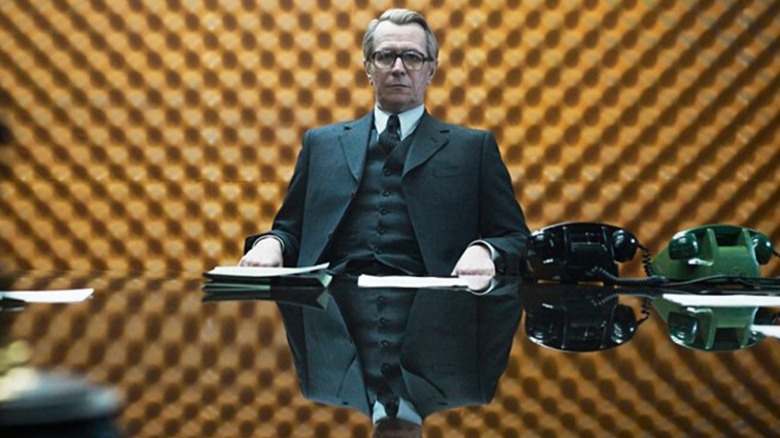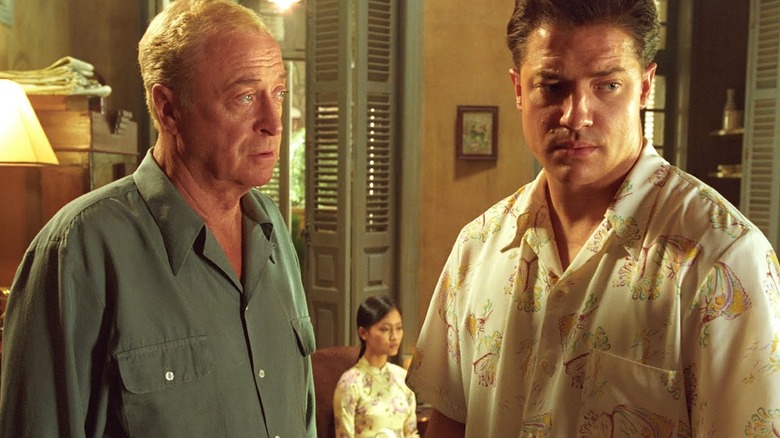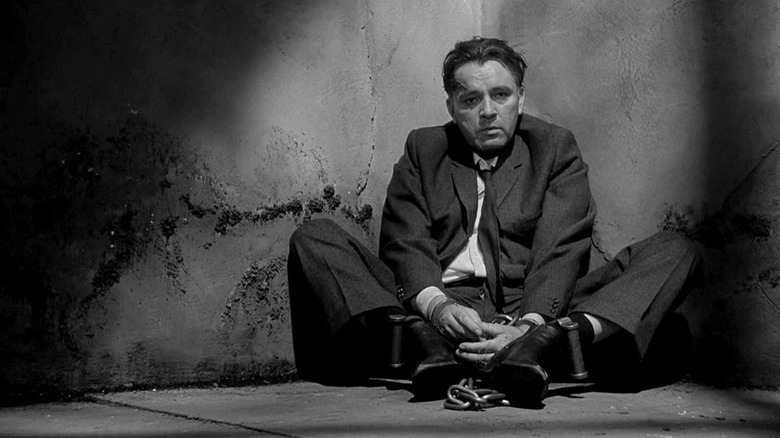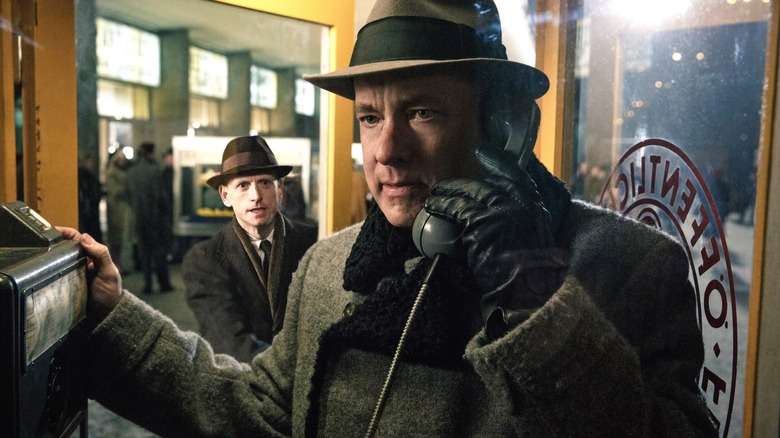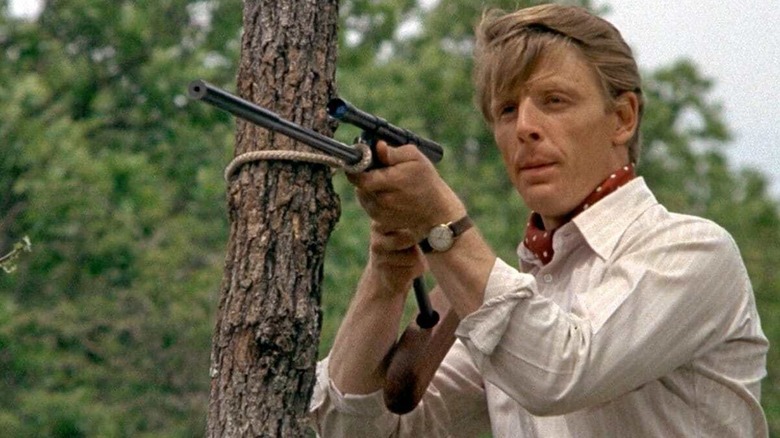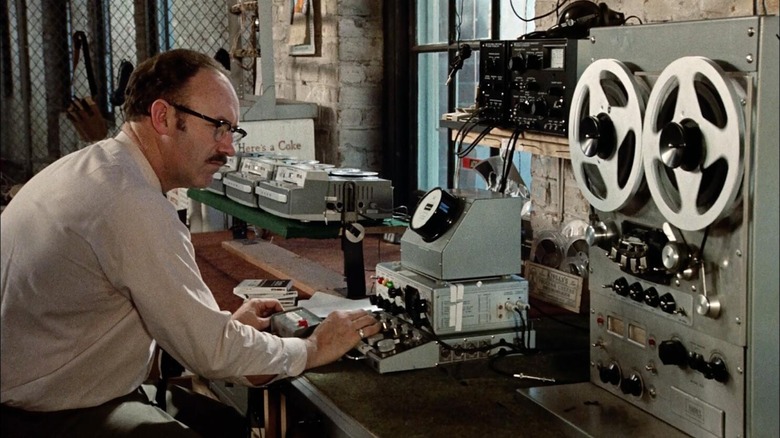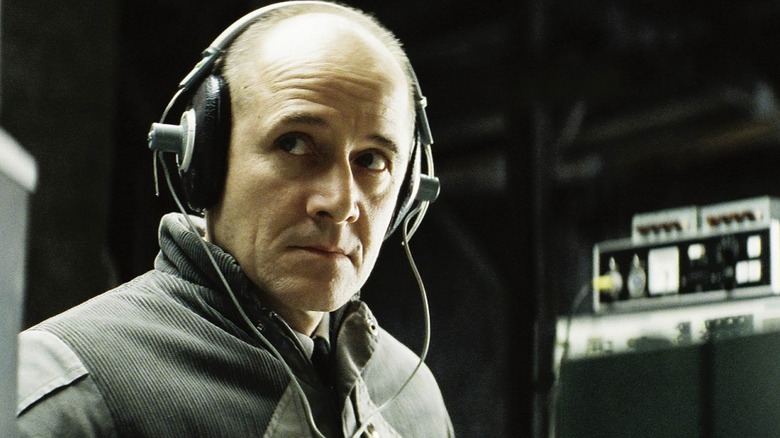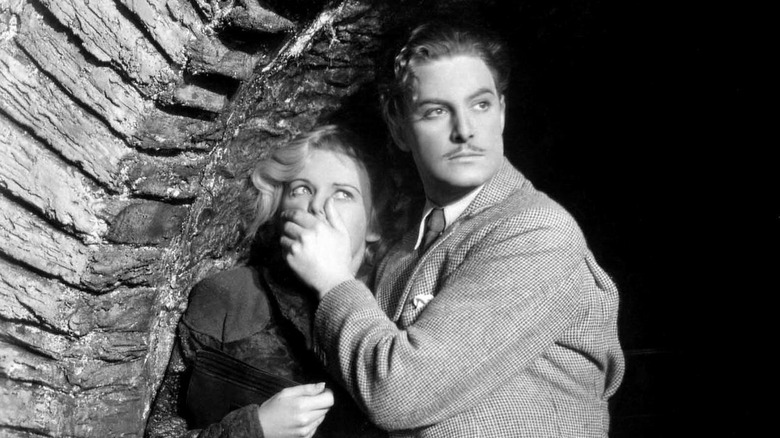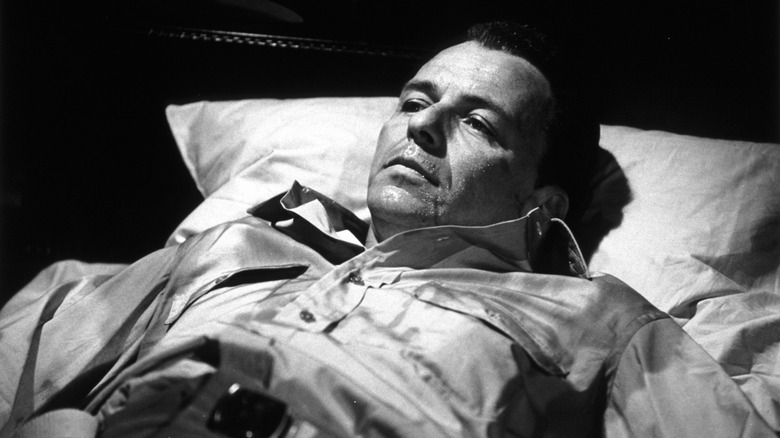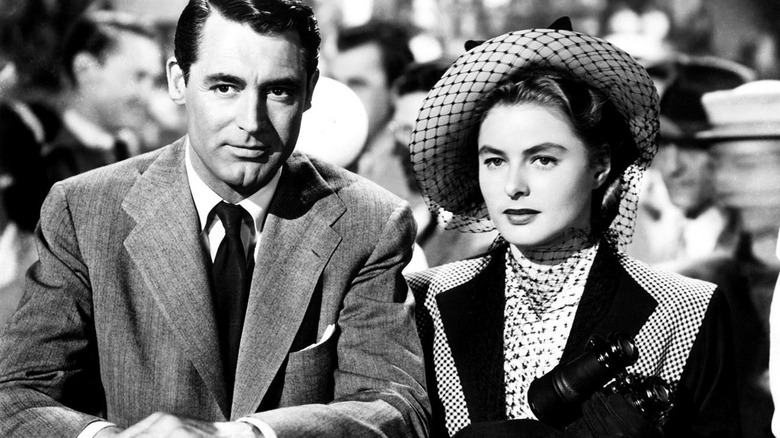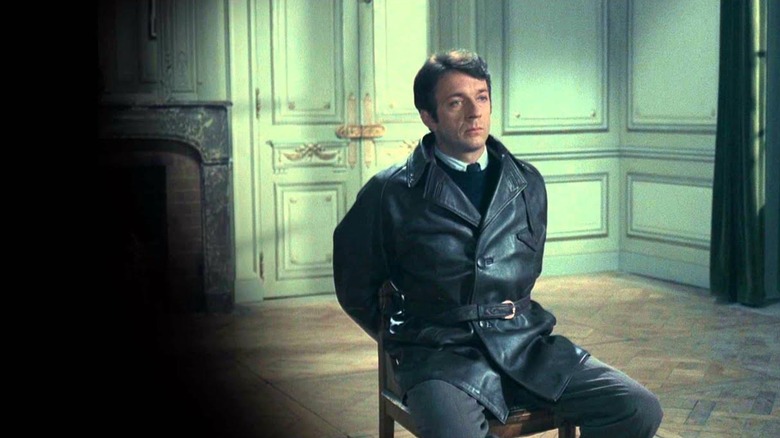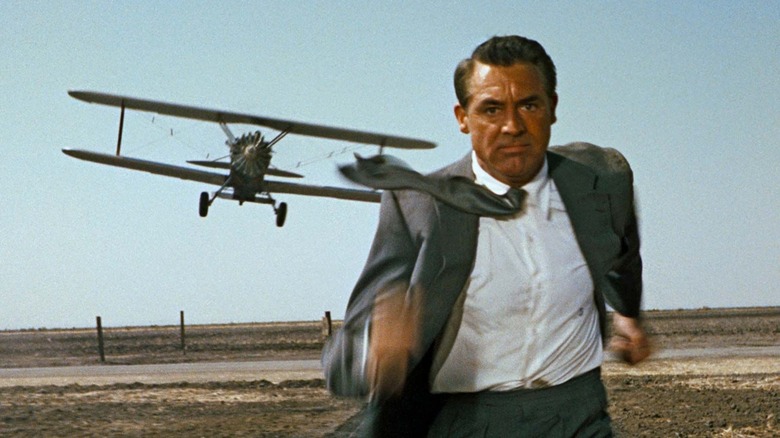The 15 Best Spy Movies Of All Time
Movies about spies who save the world have been among the most popular with the public since Alfred Hitchcock released "The 39 Steps" in 1935. That film is considered to be the first entry into the genre, and it would be followed by more exceptional movies and some long-lasting pop culture icons.
Think of how spy movies would look without the likes of James Bond, Ethan Hunt, or Jack Ryan. These series pushed the spy genre to new heights, and while many of them are excellent, they aren't necessarily the best the genre has to offer. There are numerous if not dozens of one-off films about specific espionage operations and events that stand apart from tentpole franchises.
While every movie fan has their favorites, some films are objectively better than others. Each of the spy movies detailed below are some of the most exceptional ever made, and they were chosen based on an aggregate score of their Rotten Tomatoes, Metacritic, and IMDb ratings.
The Hunt for Red October
"The Hunt for Red October" is a submarine spy thriller set during the Cold War. The film is based on Tom Clancy's novel of the same name, and it's also the first movie ever released featuring the character of CIA intelligence analyst Jack Ryan. The film centers around the titular Soviet submarine, a rogue boat led by Captain Marko Ramius (Sean Connery).
After taking the sub out on an exercise, Ramius plots a course toward the U.S. to defect. What follows is a cat and mouse game as the Soviet Union attempts to sink its own vessel before this can happen. The Americans are unsure what to make of Ramius' behavior until Ryan (Alec Baldwin) deduces the captain's true intentions.
Not only is 1990's "The Hunt for Red October" a brilliant thriller filled with espionage and intrigue, but it's also a fantastic submarine movie. Aside from Connery's inability to mask his Scottish accent, this is a pulse-pounding thrill ride that involves the incredibly high-stakes game of potential nuclear war. The film was a box office hit and a critical success, establishing the entire Jack Ryan franchise that followed.
Three Days of the Condor
Based on the novel "Six Days of the Condor" by James Grady, "Three Days of the Condor" stars Robert Redford as Joe Turner, codenamed "Condor," who works for the CIA in New York City. His job is to examine periodicals, books, and newspapers to uncover open source intelligence (OSINT) about the United States' enemies overseas.
After Turner heads out for lunch one day, he returns to find everyone in his office murdered, kicking off the action in this political thriller. Every move Turner makes is met by would-be assassins and more questions as people he thought he trusted turn on him. In the end, he uncovers a plot that targets him directly, as a report he filed threatened some bad eggs in the CIA.
The 1975 film concludes on a somewhat ambiguous note, which only amplifies the overall intrigue of the plot. "Three Days of the Condor" is one of Robert Redford's best movies, and widely regarded as one of the best of its genre, winning awards, making bank at the box office, and pleasing critics.
Munich
In 1972, 11 members of the Israeli Olympic Team in Munich for the '72 Summer Olympics were murdered by the Black September terrorist group. What followed was a Mossad mission tasked with exacting revenge by targeting and killing 11 Palestinians allegedly responsible for the attack. 2005's "Munich" tells that story, although like any film based on historical events, "Munich" isn't entirely historically accurate.
Despite this, director Steven Spielberg takes the audience through the process of selecting the agents to carry out the assignment, and how it unfolds. At the film's center is Avner Kaufman (Eric Bana), a Mossad agent responsible for leading the mission. The level of complexity of the operation is immense, as Kaufman and his team find and kill targets all over the world.
"Munich" offers a glimpse into a pivotal moment in Israeli and world history. The film not only painfully recreates the massacre and response, but it also details how the people involved dealt with the complex emotions that come from carrying out targeted assassinations, making this a particularly brutal look into the world of espionage.
Tinker Tailor Soldier Spy
"Tinker Tailor Soldier Spy" is adapted from John le Carré's novel of the same name, and like the BBC series starring Alec Guinness, the 2011 film features plenty of talent. "Tinker Tailor Soldier Spy" has brilliant performances by Gary Oldman, Colin Firth, Benedict Cumberbatch, Tom Hardy, and many others in a star-studded ensemble cast.
The film is set in London in the 1970s, where MI6 works to find a Soviet double agent working at the highest levels of the agency. The initial mission is blown, leaving the mole's identity unknown. With so much at stake, retired agent George Smiley (Oldman) is brought in to root out the spy and stop the flow of secrets from the U.K. to the Soviet Union.
Oldman gives a master class in acting, bringing Smiley a reserved intensity and shrewd intelligence that's matched only by his quiet, desperate longing for his wife. The rest of the cast follows his lead, playing lonely, dysfunctional men who jockey for power in the only life they know. "Tinker Tailor Soldier Spy" is spycraft filmmaking at its finest, and easily one of the best underrated spy movies everyone should watch.
The Quiet American
Graham Greene's novel "The Quiet American" was adapted into a film in 1958, but that version strayed from the author's primary theme of avoiding interference in foreign affairs. The 2002 film, "The Quiet American," is faithful to the source, detailing questionable American actions in the First Indochina War. Michael Caine plays the lead opposite Brendan Fraser, and it's fair to say it's one of Caine's most memorable movies.
The film tells the story of British journalist Thomas Fowler (Caine), CIA operative Alden Pyle (Fraser), and a Vietnamese woman caught between the two. Its release delayed by a year due to poor test screenings in the wake of the September 11 terrorist attacks, it was a box office bomb, only managing to rake in $27.6 million off a production budget of $30 million. Still, while people didn't flock to see it in theaters, "The Quiet American" was well-received by critics.
Like any political drama with spycraft and subterfuge thrown into the mix, "The Quiet American" maintains a tense pace as it heads towards its inevitable, somber conclusion. Caine and Fraser both shine in this film, easily one of Caine's best performances as a lead, for which he received an Academy Award nomination for best actor.
The Spy Who Came In From the Cold
"The Spy Who Came In from the Cold" is another adaptation of a novel written by John le Carré. The 1965 film is centered around agent Alec Leamas (Richard Burton) and his mission to undermine an East German intelligence officer. To do this, he pretends to defect after being dismissed from MI6.
It doesn't take long for East German agents to take notice, and he's soon recruited to their side. What makes this movie so compelling is Burton's brilliant portrayal of a beleaguered man caught up in alcoholism as a means of tempting his enemies to take him in. What Leamas doesn't realize is that there's an underlying duplicity to his mission that he wasn't made aware of.
Ultimately, it reveals itself, helping him to accomplish the mission and its hidden objectives. "The Spy Who Came In from the Cold" is one of the greatest British spy movies ever made, which was made clear when it took home four BAFTA Awards as well as an Academy Award nomination for Burton as best actor.
Bridge of Spies
Steven Spielberg may have made a name for himself in the adventure and sci-fi genres, but he's also mastered spy films as well. "Bridge of Spies" is one of the director's more impressive films, featuring Tom Hanks in the lead alongside Amy Ryan, Alan Alda, Mark Rylance, and others. The 2015 film is set during the Cold War and tells the story of an attorney tasked with an important mission.
James B. Donovan (Hanks) must negotiate for the release of a downed U-2 pilot, Francis Gary Powers (Austin Stowell). If that sounds familiar, it's because the film is based on the real story of Powers' rescue from the Soviet Union after he was shot down and convicted of espionage. The film's title is a reference to Glienicke Bridge, where the prisoner exchange took place in the 1960s.
Like any movie covering a historic event, some liberties are taken with the story to keep things entertaining. Despite this, "Bridge of Spies" is largely accurate to the truth of what happened, and it stands as a fascinating look behind the curtain at the politics and espionage that were constantly present throughout the Cold War.
The Day of the Jackal
"The Day of the Jackal," a 1973 political thriller starring Edward Fox and Michael Lonsdale, is based on Frederick Forsyth's novel of the same name, which is about a professional hitman known only as the Jackal (Fox). The film follows the Jackal on his mission to assassinate French president Charles de Gaulle in the early 1960s.
The assassination plot is enacted by Organisation Armée Secrète (OAS), an underground group angry over the liberation of Algeria from France. After their first attempt to kill de Gaulle fails, they hire the Jackal for half a million dollars, and he calmly sets out on his mission. Hot on his tail is Deputy Commissioner Claude Lebel (Lonsdale), who hunts him throughout the film.
"The Day of the Jackal" is the first adaptation of the novel; 1997's "The Jackal," starring Bruce Willis in the title role, was more recently followed by a 2024 TV version streaming on Peacock. The 1973 film received an Academy Award nomination and other accolades, and was well-received by critics, holding a 91% rating on Rotten Tomatoes.
The Conversation
Director Francis Ford Coppola may be known for his "Godfather" trilogy and "Apocalypse Now," but he also dabbled in the neo-noir thriller genre via 1974's "The Conversation," starring Gene Hackman. In the movie, Harry R. Caul (Hackman) is a surveillance expert working in San Francisco as a wiretapper. Caul is a troubled man, feeling guilty over the actions his clients have taken in the past after receiving their requested recordings.
This constant nagging doubt results in an abundance of paranoia, which turns out to be warranted after he records the phrase, "He'd kill us if he got the chance," revealing that a possible murder is going to be committed. The story unfolds to reveal the truth of what's happening, leaving Caul broken, more paranoid than ever, and in despair.
"The Conversation" isn't your typical spy movie because it doesn't involve governments trying to undermine one another through clandestine agents. Instead, the focus is on normal people, as well as a shadowy figure known only as The Director. It lingers heavily on the consequences of both Caul's action and inaction in a movie that features one of Hackman's best performances.
The Lives of Others
Set in East Germany in the early 1980s, 2006's "The Lives of Others" chronicles the monitoring of East Berlin residents by the East German secret police. Stasi officer Gerd Wiesler (Ulrich Mühe) is tasked with surveilling a famous playwright, Georg Dreyman (Sebastian Koch), to determine if he's as supportive of the Communist Party as he should be.
It doesn't take long for Wiesler to uncover the truth about his investigation; he's not checking up on the man because there's a concern over his loyalties. Instead, it's all about his girlfriend, and Wiesler's boss' interest in her. This leads Wiesler to sympathize with his target, doubting his need for surveillance and covering up Dreyman's activities.
What's so interesting about "The Lives of Others" isn't that it's set during the latter days of the Cold War, nor is it the spycraft involved. What's fascinating is how it deals with typical human interactions that play out against the backdrop of a corrupt spy system in a failing government. It's an intriguing look at politics from an entirely different perspective.
The 39 Steps
Director Alfred Hitchcock's "The 39 Steps" is regarded as the first true spy film, helping to establish the genre all the way back in 1935. The film follows Richard Hannay (Robert Donat), a Canadian living in London who finds himself caught up in a clandestine operation. The 39 Steps is an organization of spies intent on stealing secrets from the British government, and it's up to Hannay to stop them.
He's brought into the fold after he's accused of murdering an agent, forcing him to flee to Scotland, where he meets a beautiful woman, Pamela (Madeleine Carroll), as he attempts to clear his name. "The 39 Steps" is one of many Hitchcock films that pit an everyman against a vast conspiracy or criminal plot without understanding why they're involved.
The film's central mystery is the titular espionage organization, which Hannay must uncover if he's to return to any semblance of his normal life. While the film is quite well done, and it's easily a Hitchcock movie all film fans need to watch, it's often forgotten among the likes of "Psycho" and "The Birds." That's unfortunate, because "The 39 Steps" is a thrilling tale no fan of the genre should miss.
The Manchurian Candidate
"The Manchurian Candidate," a 1962 political thriller based on Richard Condon's novel of the same name, is set in the aftermath of the Korean War, focusing on Army veteran Raymond Shaw (Laurence Harvey), who is a member of a powerful political family. He's also been brainwashed by Soviet and Chinese scientists, transforming him into a sleeper agent designed to kill.
After his Army unit is captured and put through the brainwashing process, he eventually returns to the United States. Unfortunately, his conditioning kicks in, and Shaw becomes an assassin in a massive conspiracy that threatens to destabilize the U.S. government while boosting those of the People's Republic of China and the Soviet Union.
The film features an impressive cast, including Frank Sinatra, Janet Leigh, Angela Lansbury, and many others. While an excellent remake was released in 2004, it pales in comparison to the original. "The Manchurian Candidate" is a fascinating deep dive into the insidious nature of Cold War conspiracies.
Notorious
1946's "Notorious" is certainly one of the top spy movies ever made as well as one of Alfred Hitchcock's finest efforts. Cary Grant stars as T.R. Devlin, a government agent tasked with finding the executives of a pharmaceutical company as they hide out in Rio de Janeiro in the years following World War II.
Devlin enlists the aid of Alicia Huberman (Ingrid Bergman), the daughter of a German war criminal, to help in his effort. Things get a bit dicey when Devlin and Huberman fall in love, especially since Huberman is tasked with seducing an executive named Alex Sebastian (Claude Rains). The film was made in 1945, the year WWII ended, and it was released the following year, so it was especially topical upon release.
In addition to being an excellent spy movie with all the thrills you'd expect, "Notorious" is also an important film in Hitchcock's career. It was something of a new narrative for him, focusing on a love story involving two men and one woman. "Notorious" was selected for the 1946 Cannes Film Festival, following a six-year hiatus because of the war.
Army of Shadows
A French and Italian film set during World War II, 1969's "Army of Shadows" is adapted from Joseph Kessel's book of the same name, which was based on the author's experiences during his time with the French Resistance. The film focuses on a small number of Resistance members as they work their way through France, helping the Allies, killing spies, and evading the enemy.
While modern films might look upon the French Resistance with rose-colored glasses, "Army of Shadows" doesn't even approach this method of storytelling. Instead, the film is bleak and, at times, frustrating, which makes sense given the real-world elements that went into crafting the story. Kessel's novel presents fictionalized versions of the people he worked with, but it doesn't romanticize them.
The film doesn't do that either, and instead focuses on the specific story elements that drive the narrative, whether they're good for the protagonists or not. While the film was first released in 1969, it didn't make its way to the States until 2006, earning "Army of Shadows" a fresh look and elevating its standing as one of the great spy movies.
North by Northwest
Not surprisingly, Alfred Hitchcock has three of his thrillers on this list, and "North by Northwest" could be the greatest of them all. The film stars Cary Grant as Roger Thornhill (Grant), who's innocent of any crimes, but nevertheless pursued across the country by an unknown organization that has mistaken Thornhill for someone else.
The organization's goal is to abscond from the country with classified secrets, and Thornhill is thrust into the midst of the conspiracy. He soon meets Eve Kendall (Saint), and while she hides him from authorities, she's working for the foreign agent behind the plot, Phillip Vandamm (James Mason), and she doesn't have Thornhill's best interests at heart. What follows is a deadly game of cat and mouse across the country.
"North by Northwest" is undoubtedly Hitchcock's best spy movie. The film is widely considered to be important to the history of the medium, and that's largely because it combined all the various elements of the director's films — suspense, misdirection, an "everyman" hero, and a constantly shapeshifting script — into one entertaining package.
